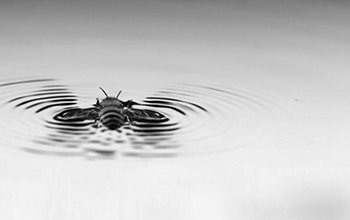搜索结果: 1-6 共查到“生物学 swimming”相关记录6条 . 查询时间(0.738 秒)

Bees' movements may lead to new swimming, flying robots(图)
Bees movements new swimming flying robots
2020/1/21
Walking on Caltech's campus, engineer Chris Roh happened to see a bee stuck in the water of Millikan Pond. Although it was a common sight, it led Roh and his colleague Mory Gharib to a discovery about...

Tiny swimming 'doughnuts' deliver the biomedical goods(图)
Tiny swimming doughnut biomedical good
2019/11/5
Bacteria and other swimming microorganisms evolved to thrive in challenging environments. But it's difficult to harness these microorganisms' abilities for biomedical purposes, so NSF-funded researche...
Dispersion of swimming algae in laminar and turbulent channel flows: theory and simulations
algae swimming microorganisms Taylor dispersion DNS turbulent transport bioreactors
2012/5/31
Algal swimming is often biased by environmental cues, e.g. gravitational and viscous torques drive cells towards downwelling fluid (gyrotaxis). In view of biotechnological applications, it is importan...
Biased swimming cells do not disperse in pipes as tracers: a population model based on microscale behaviour
Algae dispersion swimming pipe
2012/5/17
There is much current interest in modelling suspensions of algae and other micro-organisms for biotechnological exploitation, and many bioreactors are of tubular design. Using generalized Taylor dispe...
The effect of lordosis severity on juvenile sea bass (Dicentrarchus labrax L., 1758) swimming performance
Lordosis severity swimming performance Ucrit sea bass
2010/3/25
The relationship between the lordosis severity and swimming performance in sea bass juveniles was investigated. In total, 149 experimental animals 110-130 days old that ranged from 1.44 to 3.44 g (mea...
Effect of Temperature Change on Maximum Swimming Speed of Whiting, Merlangius merlangus (Linnaeus, 1758)
Merlangius merlangus temperature effect muscle contraction escape speed
2010/3/30
Seasonal changes in sea temperature levels affect the swimming performance of fish. This study investigates if a change of 5°C from 7 to 12°C in water temperature has a significant effect on the maxim...

